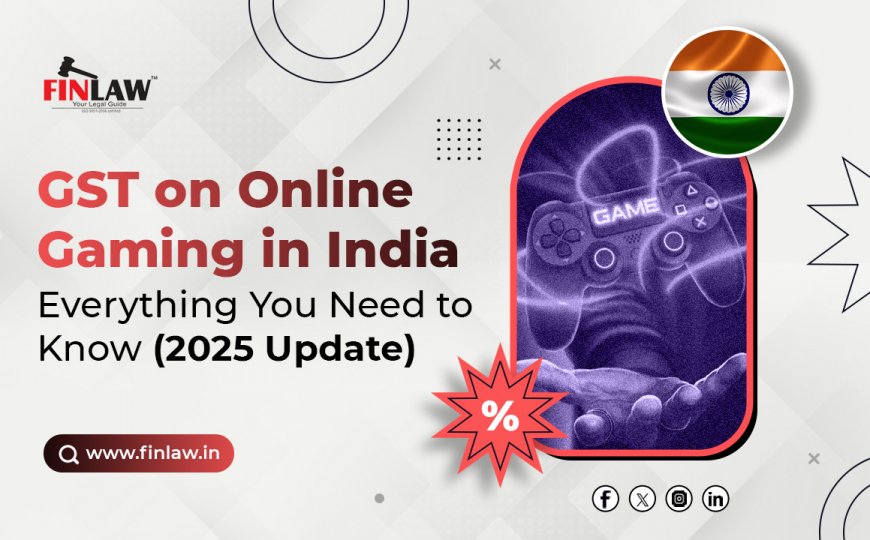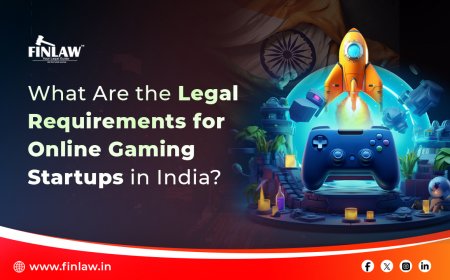GST on Online Gaming in India: Everything You Need to Know (2025 Update)
Get the latest 2025 update on GST on online gaming in India. Learn how the 28% GST impacts gaming platforms, legal challenges, retrospective taxation, and what lies ahead for the industry.

India’s online gaming ecosystem is booming, with over 442 million users and growing rapidly across segments like fantasy sports, poker, rummy, e-sports, and casual mobile games. However, the recent overhaul of the GST on online gaming in India has stirred widespread debate and regulatory uncertainty.
The Goods and Services Tax (GST) Council’s 2023 decision to levy a 28% tax on the full face value of bets has fundamentally changed how gaming companies operate. With further developments expected in 2025, it's crucial for gamers, entrepreneurs, investors, and tax professionals to stay updated.
In this comprehensive guide, we break down everything you need to know about GST implications on online gaming in India, including recent updates, legal challenges, industry concerns, and future outlook.
What is GST on Online Gaming?
Defining Online Gaming Under Indian Law
As per the amendments introduced by the GST Council, online gaming is categorized into:
-
Online money gaming: Games where participants pay or stake money to play and can win monetary rewards.
-
Casual gaming (non-monetary): Free-to-play games without any monetary stakes or winnings.
The 28% GST applies only to online money gaming, making the distinction critical.
Evolution of GST on Online Gaming in India
Before July 2023
Historically, a differentiation was made between:
-
Games of skill (like rummy or fantasy sports): Taxed at 18% on platform fees or Gross Gaming Revenue (GGR).
-
Games of chance (like betting or lottery): Taxed at 28% on contest entry amount.
This differentiation was rooted in Indian judicial precedents recognizing games of skill as protected under Article 19(1)(g) of the Constitution.
After the 50th GST Council Meeting (July 2023)
In a sweeping decision, the GST Council approved the uniform imposition of 28% GST on the total amount paid by users, whether the game is based on skill or chance.
The key change:
GST is now charged on the entire bet value (face value), not just on the platform's commission or GGR.
Retrospective Taxation from 2017
The decision also sparked controversy due to its retrospective application from July 1, 2017. This has led to tax notices amounting to thousands of crores being served to gaming platforms, notably:
-
Gameskraft Technologies Pvt. Ltd. received a tax notice of ₹21,000 crore, triggering legal action.
2025 Legal Status and Supreme Court Challenge
Several online gaming platforms have challenged the new GST regime in court. As of April 2025:
-
The Supreme Court is set to hear consolidated petitions against the retrospective and blanket 28% GST on May 5, 2025.
-
The industry is hoping for clarity on forward vs. retrospective application and possible reinstatement of the skill-vs-chance distinction.
Key legal questions:
-
Is imposing GST on the face value (instead of GGR) constitutionally valid?
-
Can retrospective application be justified?
-
Should skill-based gaming enjoy a different treatment?
Impact of GST on the Online Gaming Industry
1. Financial Burden on Startups and Platforms
The 28% GST on face value significantly increases operational costs for gaming startups, many of which operate on thin margins. For example:
-
A ₹100 entry fee now attracts ₹28 in GST, leaving only ₹72 to cover prize money and platform expenses.
2. Investor Sentiment Dented
Several venture capital firms have paused or pulled back investments in gaming platforms. Legal ambiguity and tax unpredictability are seen as high-risk factors.
3. Player Experience and Prize Pools Shrinking
To stay profitable, platforms are either:
-
Increasing entry fees to offset tax
-
Reducing prize money
-
Charging higher service fees
This diminishes user experience and may push users toward offshore or unregulated platforms.
4. Offshore Competitors Gain Ground
Indian players can easily access international gaming platforms not governed by Indian tax laws. This creates a non-level playing field and may result in revenue leakage for the Indian government.
Comparison With Global Tax Practices
|
Country |
Tax Model |
Rate (%) |
Base |
|
UK |
Gambling Duty |
15% |
GGR |
|
USA (varies) |
State-level tax on betting/gaming |
6–51% |
GGR |
|
Singapore |
Goods & Services Tax |
8% |
Net revenue |
|
India |
GST on Online Gaming (post-2023) |
28% |
Face value |
India is now among the highest-taxed jurisdictions in the online gaming sector.
Industry’s Recommendation and Reform Proposals
What the Industry Wants
-
Revert to GGR-based taxation for skill-based games.
-
Cap GST at 18% to encourage legal platforms and avoid black-market migration.
-
Forward-looking application of rules only, not retrospective.
-
Establish a regulatory body to provide industry clarity.
Several trade associations, including All India Gaming Federation (AIGF) and E-Gaming Federation (EGF), have submitted representations to the government advocating these changes.
Government’s Response So Far
The government has acknowledged industry concerns but has reiterated that:
-
The new GST model is essential for revenue generation and uniformity.
-
Compliance is mandatory until courts rule otherwise.
A Group of Ministers (GoM) has been tasked to reassess and submit a final report post the Supreme Court decision in 2025.
FAQs on GST on Online Gaming in India
Is GST applicable to free-to-play games?
No. GST is applicable only on real-money games where players wager money and win prizes.
Do users have to pay GST separately?
No. The platform is responsible for collecting and remitting GST. However, the tax is usually included in the entry or stake fee.
Can gaming companies claim input tax credit (ITC)?
Most companies in this sector cannot claim ITC due to the way real-money gaming is classified under the law.
Final Thoughts
The future of GST on online gaming in India hinges on the outcome of key legal challenges and potential government reforms. While the intention to regulate and tax online gaming is valid, a balanced and forward-thinking approach is essential to sustain innovation, protect consumers, and ensure that India remains a hub for gaming startups.
As we await further updates in 2025, stakeholders must stay vigilant, compliant, and prepared for both regulatory and judicial outcomes.
What's Your Reaction?



















